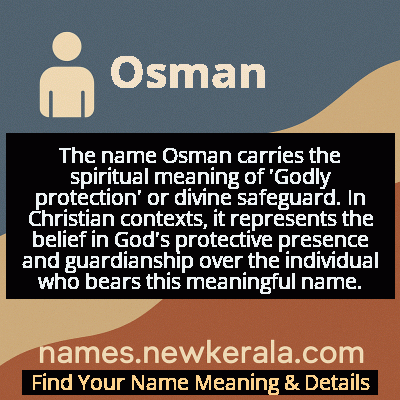Osman Name Meaning & Details
Origin, Popularity, Numerology Analysis & Name Meaning of Osman
Discover the origin, meaning, and cultural significance of the name OSMAN. Delve into its historical roots and explore the lasting impact it has had on communities and traditions.
Name
Osman
Gender
Male
Origin
Christian
Lucky Number
8
Meaning of the Name - Osman
The name Osman carries the spiritual meaning of 'Godly protection' or divine safeguard. In Christian contexts, it represents the belief in God's protective presence and guardianship over the individual who bears this meaningful name.
Osman - Complete Numerology Analysis
Your Numerology Number
Based on Pythagorean Numerology System
Ruling Planet
Saturn
Positive Nature
Ambitious, efficient, realistic, and authoritative.
Negative Traits
Materialistic, stressed, confrontational, and can be overly ambitious.
Lucky Colours
Dark blue, black.
Lucky Days
Saturday.
Lucky Stones
Blue sapphire, amethyst.
Harmony Numbers
2, 4, 6.
Best Suited Professions
Business leaders, managers, financial services, law enforcement.
What People Like About You
Leadership, determination, organizational skills.
Famous People Named Osman
Osman I
Founder of Ottoman Empire
Established the Ottoman Empire which lasted for over 600 years
Osman Ali Khan
Nizam of Hyderabad
Ruled as the last Nizam of Hyderabad and was once considered the richest man in the world
Osman Sow
Professional Footballer
Swedish international striker who played for clubs in multiple European leagues
Osman Kavala
Businessman and Philanthropist
Turkish civil society leader and human rights activist
Name Variations & International Equivalents
Click on blue names to explore their detailed meanings. Gray names with will be available soon.
Cultural & Historical Significance
In Christian contexts, particularly among Arabic-speaking Christians, the name maintains its spiritual meaning of 'divine protection' while honoring historical figures. The name bridges cultural divides, serving as a testament to interfaith dialogue and shared heritage in regions where Muslim and Christian communities have coexisted for generations. Its endurance across centuries reflects both religious devotion and respect for historical legacy, making it a name that carries the weight of empire-building while maintaining spiritual significance across faith traditions.
Extended Personality Analysis
Individuals named Osman are often perceived as natural leaders with a strong sense of responsibility and protective instincts toward their communities. They typically exhibit calm determination, strategic thinking, and the ability to make difficult decisions under pressure, reflecting the name's association with foundational leadership. These personalities often balance traditional values with progressive thinking, showing respect for heritage while embracing innovation in their personal and professional lives.
Their protective nature extends beyond physical safety to emotional and spiritual guardianship, making them reliable confidants and community pillars. Many Osmans demonstrate remarkable resilience in adversity and possess an innate ability to unite diverse groups toward common goals. They tend to be methodical planners who value stability and long-term vision, often serving as the moral compass in their social circles. While they can be reserved in expressing emotions, their actions consistently demonstrate deep commitment to those they care about and the causes they believe in.
Modern Usage & Popularity
In contemporary times, Osman maintains steady popularity across diverse regions including Turkey, the Middle East, Africa, and European diaspora communities. While traditionally more common in Muslim populations, the name has gained cross-cultural appeal among Christians who appreciate its meaning of divine protection and its historical significance. Modern usage shows particular strength in multicultural urban centers where parents seek names with historical depth and spiritual significance that transcend single cultural traditions. The name enjoys moderate but consistent usage in Western countries, often chosen by parents seeking a distinctive yet meaningful name that bridges cultural traditions while providing a strong, classic sound. Recent decades have seen stable popularity rather than dramatic trends, indicating its enduring appeal across generations and its resistance to fleeting naming fashions.
Symbolic & Spiritual Meanings
Symbolically, Osman represents divine guardianship, historical continuity, and cultural bridge-building. The name embodies the concept of spiritual protection as a shield against adversity, reflecting its core meaning of 'Godly protection' in both Christian and Islamic traditions. It symbolizes the intersection of faith and leadership, suggesting someone destined to provide guidance and safety to others while maintaining strong moral foundations. Metaphorically, Osman represents the foundation upon which great things are built, much like the Ottoman Empire's origins from its namesake founder. The name also carries connotations of wisdom accumulated through generations and the responsibility that comes with heritage, serving as a living connection between past glory and future potential. This makes it a powerful symbolic choice for those valuing both tradition and progress, protection and empowerment, historical awareness and contemporary relevance.

